Text
Measurements Template Print (Copy this/Do not delete) (Kopie)
© Daniel Rivers. All rights reserved. Unauthorized use, reproduction, or resale without permission is prohibited.
0 notes
Text
What the F*CK is going on?
The past few weeks have been pure madness, frustration, and helplessness. Since the elections, I’ve been spending way too much time on Reddit and the news again. Too much for my own good. Hoping that justice will finally come, the justice I’ve been waiting for months. I sit apathetically in front of my smartphone, compulsively refreshing my feed in the hope of seeing that there’s still a bit of justice in the world. In vain. Instead, headline after headline, bombshell after bombshell, audacity after audacity. My mind, tired and broken, in disbelief about what is happening. That we are once again confronted with so much hate and injustice, and at the same time, no clear solutions are being presented, just hate speeches or politicians trying to keep their heads above water amidst all the chaos. Two people, in particular, have been a thorn in my side. As you can imagine, I’m talking about Donald Trump and Elon Musk.
It frustrates me to see how we are in the process of undoing 70 years of progress. For what? Power, commerce, and attention. The elections were yet another slap in the face, and even more so, the inauguration of Donald Trump. And Musk’s infamous Hitler salute.
Many call Elon Musk a genius. A genius who has supposedly built and revolutionized so many companies. What defines a genius? I can only say that, in my eyes, Musk is neither a genius nor a visionary. Yes, Tesla was groundbreaking in its time, and SpaceX is no less impressive with its reusable rockets, but this is not thanks to Elon Musk. The real geniuses are the engineers and architects working in Musk’s shadow. They are the ones who make things possible. Musk throws money at them and poses as if he invented and created it all. I see Musk as a fragile, insecure ego that does everything for attention, and when he doesn’t get it, he behaves like a small child. He provokes without having any idea of the impact the richest person in the world can have. Whether it’s buying Twitter to surround himself with yes-men under the guise of “freedom of speech” or sympathizing with the AfD, a far-right party that has been trying to gain power in Germany for over a decade. A party that has often spread anti-American slogans, only to bend over backward at the slightest acknowledgment from Musk and become a staunch America supporter. Without realizing that he’s just using them.
To me, a genius is someone who morally and intellectually wants the best for humanity and its progress. Someone who does not fuel hate and injustice for their own benefit but instead tries to help even the weakest. 1% of Elon Musk’s wealth could help so many people, but instead, he perpetuates old rhetoric and tries to destabilize governments. Essentially, he’s doing what Trump does—just … dumber. The image Elon tried to build for so many years starts to fade and people now realizing who he really is.
With Donald Trump, we all knew what to expect, which makes me even more disappointed in American society. We didn’t have much else; we had Harris, a normal politician. She isn’t perfect, but at least she was a real politician with genuine views and plans. And yet, even though we knew what was coming, we chose Trump. A man who, like Musk, doesn’t care about other people and is only focused on his own benefit. A man who has no respect for other people or societies, who only serves his own interests, and who is currently building a dictatorship. A man who spreads lies to feed his narrative, with a following that never questions any of it. And as a result, women, queer people, “immigrants,” and non-white people will suffer the most.
However, there was also a lesson to be learned from the events of the past few months. What we can take away from this whole story is that we Europeans need to stay strong. Now, more than ever, we need to learn to stick together. I wish it were different, but this is our timeline now, and we have to live with it and try to make the best of it. Above all, we need to ensure that we, as Europeans, don’t tear each other down and aren’t torn down by others either.
Does history really have to repeat itself, or do we have the chance, in this age of information and enlightenment, to do something about it this time?
I’m depressed. Depressed and sad to have to watch how, in recent weeks and years, so much has been reinforced that we’ve been trying to fight against for so many decades. We could achieve so much if we worked together as humans. All the visions we’ve always had of the future—the progress, the prosperity, the utopias. All of it feels like it’s slipping away into a future over which we have no power or control. My desire for justice is so great that it almost hurts. And I hope that, as humans, we find a solution. Or maybe it’s simply in our nature to see each other as rivals, driven by greed at the expense of people and nature … I don’t know. What I do know is that I’m tired.
To my German readers: With the current events, I ask you, please go vote on 23.02! I’m not here to tell you who to vote for, but take a close look at the election program of the party you choose. Remember, we’re all frustrated right now and uncertain about what’s ahead. Don’t let propaganda consume you. Propaganda has nothing to do with solutions—it only fuels fear and creates division.
Photo by Stormseeker
1 note
·
View note
Text
The Internet
A Failed Project
Oh, the internet. It started off with such promise. Since the early ’90s, we’ve been exploring its commercial potential, opening new worlds of information, self-presentation, and marketing. Shops could showcase themselves virtually, hobbies could be shared across continents, blogs… It felt like the future was wide open.
Things evolved gradually, starting with AOL chat rooms in 1997, where strangers could chat anonymously. Then came MySpace in 2003, laying the groundwork for social media. Facebook arrived in 2004, initially exclusive and invitation-only (because exclusivity always makes things better). Then YouTube and Twitter in 2006, the first iPhone in 2007 (not the first touchscreen, but it redefined smartphones as we know them). Instagram in 2010, Snapchat in 2011, Vines in 2013, each a little more “innovative,” each drawing us in deeper.
It was new and exciting. We could share with friends and family, meet people around the world. Creativity felt limitless, and everything looked so shiny on the surface. But soon, phrases like “Facebook syndrome” crept in. We’re humans; we’ve always compared ourselves to others, and that’s part of how we evolve. But now we weren’t just comparing ourselves to the neighbors or colleagues; we were up against curated snapshots of perfection, endless windows into idealized lives. Nothing quite like being alone with your phone, scrolling through everyone else’s picture-perfect moments, right?
Social media was there, but it wasn’t everywhere. Not yet.
Then came 2016. Meta introduced its infamous algorithm on Instagram, Twitter’s political polarization escalated, and Musical.ly/TikTok burst onto the scene. The dream became a full-blown fever.
The shift from “old” to “new” social media was so subtle we almost didn’t notice. We went from sharing memes, funny videos, and genuine creativity to a digital landscape where self-image is distorted beyond recognition. Teens now reshape their faces to match a narrow beauty ideal that wipes out individuality and makes everyone look exactly the same. Social media has turned into a competition to see who’s the most oppressed, while AI-generated content and bots amplify every trend and opinion until it’s inescapable but dying just a few days later. Outrage has become the new currency, fueling endless engagement and keeping users in a perpetual state of provocation.
LinkedIn became a corporate butt-kissing paradise, where “job opportunities” await, and tearful CEOs with millions boast about the “humbling experience” of firing someone. Facebook and TikTok’s echo chambers feed a steady diet of extreme views, pushing them deeper into isolation. Meanwhile, Twitter has become a breeding ground for hate and bigotry, each post further dividing us, with society splintering faster than a badly built IKEA chair.
Some influencers, always on the lookout for profits, glamorize gambling and promote online games that make high-stakes risks look like innocent fun. Others drive fast fashion, urging us to buy and discard cheap, disposable clothing that exploits workers and pollutes the planet. And let’s not forget the crypto and NFT hustlers, selling dreams of quick riches to anyone feeling the squeeze of rising living costs, only to leave them broke through the latest pump-and-dump scheme.
Even streaming services like Netflix are in on the game, designed to keep us binge-watching for hours on end. As Netflix’s co-CEO once put it, their biggest competitor is sleep. And Google? It doesn’t serve up the answers you need; it serves the ones it thinks you want, pulling you into endless searches, wondering if that weird-looking spot might be cancer. But don’t worry, here are those shoes you searched for last month; they’re on sale now.
Don’t get me wrong, the internet is an incredible tool. We theoretically hold the knowledge of all the world’s libraries in our hands. We can still create, connect, and find community around the globe. Thanks to the internet, we’ve been able to uncover and clarify so much—not just regionally but internationally as well. The #MeToo movement, for instance, would have been nearly impossible without the internet. The same goes for global conflicts and crises. But then, it raises the question—how much information is actually good for us?
Consider local news. Not every incident in a city makes it to print. This isn’t about censorship or cover-ups; it’s just that if every event were reported, newspapers would become books. And if we knew every single tragedy happening around us, would we even want to leave our homes? Sometimes, knowing less might actually help us feel safer and more connected, even if our empathy urges us to learn it all.
Consider human evolution: Humanity has existed for roughly 1.9 million years, but modern humans only for about 200,000. Agriculture was invented just 11,000 years ago. When you think about how slowly we evolved to that point, it’s insane to imagine the mental overload we’ve adapted to in just the past decade. The overstimulation, the flood of information, and the way corporations exploit our attention to keep us hooked should make us ask—how much control do we even have? Of everything we’re consuming, what’s actually necessary and what’s actually good for us?
For those who are now wondering how to counteract all of this: go out without your smartphone every once in a while, be unreachable. Talk to people, get to know them. Call someone for a change instead of texting. Cancel one of your streaming services. Watch regular TV. Delete or hide your social media apps, or, like I did, lock your phone away for a few days until you stop caring about it. And for those who are already doing these things, chapeau.
And finally here’s my question to you, and I encourage you to think deeply about it while taking a closer look at what you’re consuming.
If it truly had only benefits and you knew it would be good for society, could you live without your smartphone and social media? What would it take to free yourself from everything you just read?
P.S. Today I want to share a song, especially with my German readers, which fits the subject perfectly. Ich hasse es by Dota Kehr.
0 notes
Text
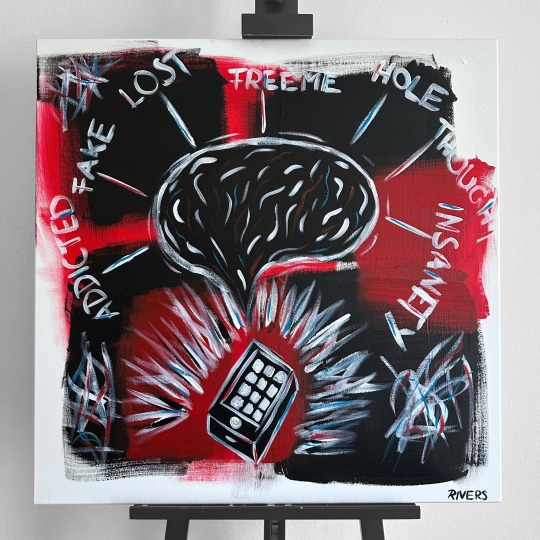
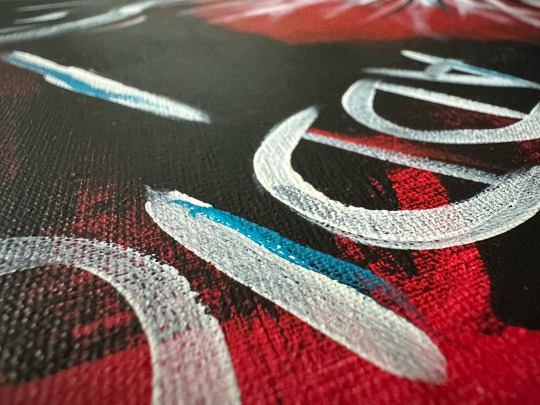
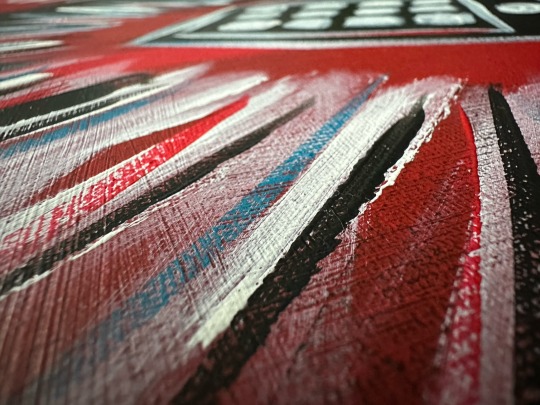

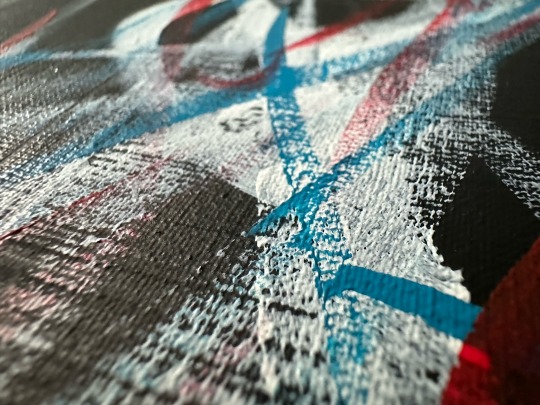

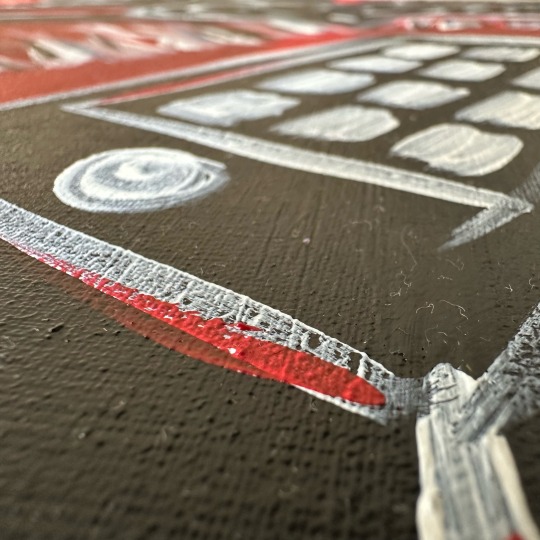
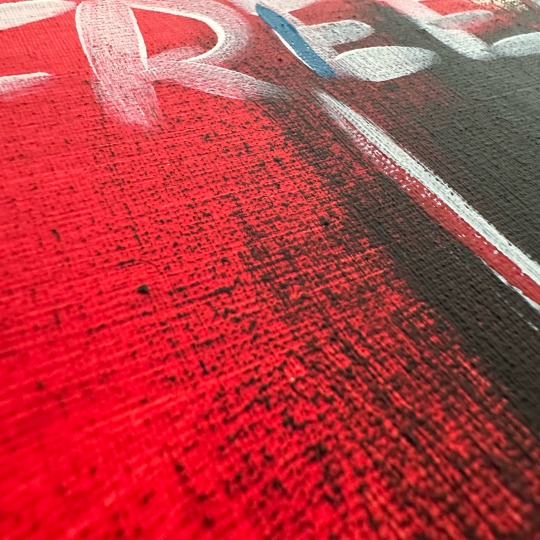
In creating “Fucked,” I wanted to depict the toll of algorithm-driven content and the constant chase for that next dopamine hit. What was once a space for connection and creativity now drives us deeper into an addictive cycle of mindless scrolling, ads, and the relentless pull to stay connected. It’s about how life has stopped imitating art and instead has begun to mirror the internet itself.
For me, this piece is a reflection on how technology shapes our daily experiences and an invitation to step back and ask: Are we still in control?
#abstractart#neoexpressionism#creativeprocess#art#artists on tumblr#painting#social media#addiction#smartphone#technology#doom scrolling#apps#thoughts#art with a message#insanity#dependency#acrylic#acrylic on canvas#canvas art#Daniel rivers#artcommunity#art gallery#expressionism
1 note
·
View note
Text
#ArtistOnTumblr#ArtCommunity#CreativeProcess#ArtisticExpression#ContemporaryArt#AbstractArt#NeoExpressionism#ArtInProgress#MixedMedia#Inspiration#ArtistLife#ArtLovers#Illustration#DigitalArt#Painting#ArtOfTheDay#ArtBlog#ArtGallery#StreetArt#OriginalArt.
0 notes
Text
Another one done. Raw, imperfect, and full of everything I didn’t say.
1 note
·
View note